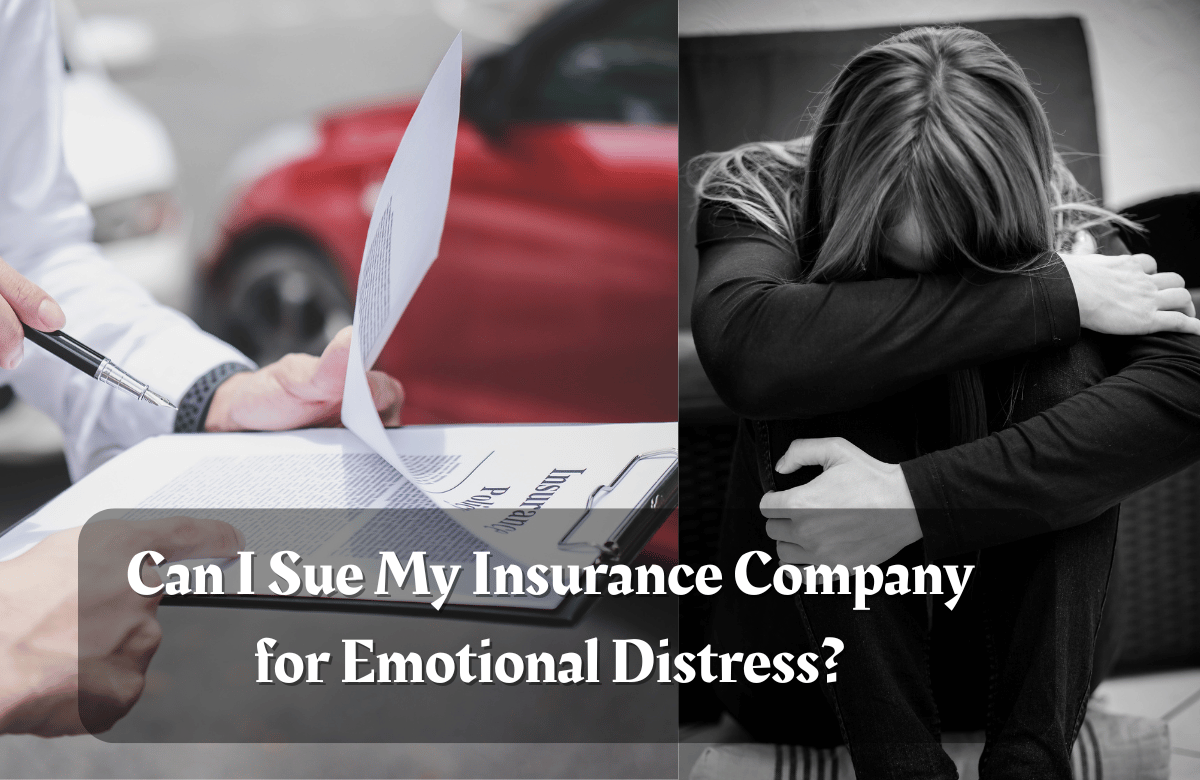Getting an insurance claim denied can be a massive headache. You pay your premiums expecting help when things go wrong, and then suddenly, you’re left dealing with everything yourself. It’s no surprise that this can be stressful and upsetting.
In some situations, you might wonder if you can sue your insurance company for the emotional distress caused by their denial. While it can be more complex, let’s explore when this might be an option.
Grounds for Lawsuit (Bad Faith)
Imagine you and your insurance company have a deal. You pay them each month, and in return, they help you financially if something covered happens. But what if they don’t hold up their end of the bargain? That’s where “bad faith” comes in.
In an insurance context, lousy faith means the company acted unreasonably when handling your claim. This can be frustrating because, on top of the initial problem, you’re now dealing with extra stress from their actions.
Here are some ways an insurance company might act in bad faith:
- Saying No When They Should Say Yes: They deny a valid claim without a good reason.
- Playing Keep Away: They unreasonably delay processing your claim, leaving you waiting for the money you need.
- Lowball Offers: They offer you less than what your claim is worth, forcing you to fight for what’s fair.
These are just a few examples, and if your insurance company did something similar, it could be grounds for a lawsuit.
Proving Emotional Distress

Winning a lawsuit for emotional distress against your insurance company isn’t easy. Even though you might feel terrible, proving it in court takes more than just your word.
Here’s the thing: emotions aren’t always clear-cut like a broken leg. Courts need evidence to show you’re genuinely suffering.
This is where documentation becomes critical. The stronger your proof, the better your chance of the court recognizing your emotional pain.
Here are some things that can help:
- If you have visited a doctor for stress, anxiety, or other issues related to insurance, make sure to obtain copies of their notes.
- If you have been receiving therapy, your therapist’s records can be substantial evidence of your emotional well-being.
- Maintaining a journal where you document your emotions and how the insurance situation impacts your daily life can provide valuable documentation.
Remember, the more details you have, the stronger your case will be.
Impact of Emotional Distress
Dealing with a denied insurance claim, on top of whatever situation caused it, can be a significant emotional strain. It’s important to remember that your distress is valid and can show up in many ways, both mentally and physically.
Here are some signs you might be experiencing emotional distress:
- Anxiety: You might feel constantly worried, on edge, or have trouble relaxing.
- Sleep Problems: Trouble falling asleep, waking up frequently, or having nightmares can all be signs of emotional distress.
- Feeling Down: You might experience low mood, sadness, or a loss of interest in activities you used to enjoy. These could be signs of depression.
These emotional symptoms can lead to disruptions in your daily life. Emotional distress can also cause chaos in your everyday activities.
- Work Struggles: It can be hard to focus or be productive when feeling overwhelmed.
- Relationship Strain: Emotional distress can make it harder to connect with loved ones and can lead to arguments or withdrawal.
If you notice any of these signs, asking for help is essential. By reaching out, you can learn ways to cope and take control of your emotional distress with the help of a therapist.
Potential Damages
Suppose you win a lawsuit against your insurance company for acting in bad faith. In that case, you have the potential to receive compensation for damages in two main areas:
- Economic Damages are the tangible financial losses you incurred due to the denied claim. This could include repair costs, medical bills, or lost wages. The potential for compensation here is significant.
- Non-Economic Damages: These are harder to quantify because they relate to the emotional pain and suffering you experienced. This is where emotional distress comes in.
Here are some specific examples of non-economic damages related to emotional distress that you might be able to claim:
- Mental anguish: This covers the stress, anxiety, and overall emotional suffering caused by the insurance company’s actions.
- Loss of enjoyment of life: If the emotional distress significantly impacts your ability to enjoy activities you used to, this could be compensable.
- Loss of sleep: The court might award damages for sleep problems caused by the stress of the situation.
- Physical symptoms: If the emotional distress manifests as physical problems like headaches or stomachaches, these could be included in your damages claim.
It’s crucial to acknowledge that each situation varies, and the level of non-economic compensation granted will be based on the extent of your emotional suffering and the proof you provide.
Importance of Legal Counsel

It takes work to take legal action against an insurance company. They have highly skilled legal teams adept at working within the legal framework. They will do everything they can to resist making significant payouts.
Attempting to challenge an insurance giant alone can be daunting and ultimately fruitless. This underscores the importance of seeking guidance from an attorney specializing in insurance bad faith claims.
Understanding the Law: The rules about bad faith claims can be intricate and differ from state to state. A knowledgeable attorney will know the applicable laws and how to utilize them in your specific circumstances.
Gathering Evidence: Building a solid case requires meticulous documentation of your emotional distress and the insurance company’s bad faith actions. A lawyer will know what evidence is needed and how to collect it effectively.
Negotiation and Litigation: An attorney can manage all correspondence with the insurance company, bargain on your behalf, and serve as your representative in court if needed. They possess the expertise and abilities to advocate for the compensation you are entitled to.
While the prospect of legal fees can be daunting, it’s important to note that insurance bad faith attorneys often operate on a contingency basis. This means they only receive payment if you win your case. In many instances, the potential compensation from a successful lawsuit can far exceed the cost of legal representation.
Remember that you don’t have to face this difficult situation by yourself. A skilled attorney can support you and assist you in obtaining the justice you are entitled to.
Conclusion
If certain conditions are met, you can sue your insurance company for emotional distress. If your insurance company has acted in bad faith, such as denying a valid claim, causing unreasonable delays, or offering unfair settlements, you have legal options. The emotional impact of these issues is significant, and the law provides recourse for those affected.
Successfully proving emotional distress requires thorough documentation and a clear demonstration of how the insurance company’s actions have affected your mental and emotional well-being. Evidence from medical professionals and therapists and your detailed records can strengthen your case.
If you are considering this possibility, consulting with a legal professional is crucial. A proficient lawyer who handles lousy faith cases in insurance can assist you throughout the legal proceedings, aid in collecting essential evidence, and stand up for your rights.
While taking on an insurance company might seem daunting, the potential compensation for economic and non-economic damages can provide relief and recognition for your suffering.
Remember, you don’t have to handle this difficult situation alone. Contact a qualified attorney if you’re experiencing emotional distress because of your insurance company’s actions. You can rely on them to assist you in pursuing rightful justice and compensation.
FAQs
What kind of evidence do I need to prove emotional distress?
Given the subjective nature of emotions, courts rely on hard evidence. This can include doctor’s notes for stress or anxiety, therapist records, or a personal journal detailing how the situation affects you emotionally. This emphasis on evidence ensures the objectivity of the legal process.
What are non-economic damages?
These damages compensate for emotional pain and suffering rather than concrete financial losses. Examples include mental anguish, loss of enjoyment of life, or sleep problems caused by the stress of the situation.
Should I get a lawyer?
Suing an insurance company is complex. They have teams of lawyers, and navigating the legal system alone can be difficult. An attorney specializing in bad faith claims can understand the laws, gather evidence, negotiate with the company, and represent you in court if needed.
Isn’t suing expensive?
Numerous attorneys who handle insurance bad faith cases operate on a contingency basis, which means they receive payment only if you achieve a favorable outcome. The potential financial reward from a successful lawsuit can surpass the expenses associated with legal representation.





